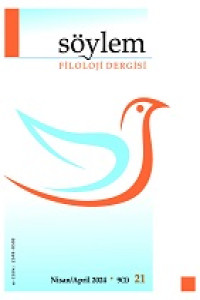Abstract
Due to his cognitive structure, human beings are prone to arranging, classifying or ordering the entities, events and situations that they see as complex. It is often quite difficult to encode an event with all its phases by language, as events occur in a flow. For this reason, the speaker is coding about which stage of the event he will emphasize, other stages of the event are usually completed in the mind or the discourse is completed in another sentence. The speaker's knowledge of the event and his desire to describe the event in detail or superficially can also determine which type of verb will encode the event. Before speaking, certain event schemes are created in the mind and these events are conceptualized through certain verbs. The event, which is conceptualized according to the type of message to be conveyed, turns into a linguistic expression by being superficial with a single or multiple verb. The same physical event shows syntactic, structural and semantic differences between languages in terms of the way it is conceptualized. This is due to the speakers' perception of the world, the structural features of the spoken language, and the cultural characteristics of some conceptual events. For this reason, the emergence of language-specific conceptual events has led to the emergence of different language-specific verb structures (such as serial verb structures). The cultural characteristics and world perception underlying conceptual events are encoded in the language with such verb structures. In some cases, it is difficult to translate verbs that express conceptual events into another language, just like idioms. In this article, some verbs in Turkish will be examined in terms of their event conceptualization features. In addition, it will be tried to draw a general framework about the event-verb relationship and the level at which events are represented by the verbs.
Keywords
References
- Aksoy, Ömer Asım (1984). Atasözleri ve Deyimler Sözlüğü (Cilt II). Ankara: TDK Yayınları.
- Aristoteles (1996). Metafizik. (Çev.) Ahmet Arslan, İstanbul: Sosyal Yayınlar.
Abstract
İnsan zihni, yapısı itibarıyla karmaşık olarak gördüğü varlık, olay ve durumları düzene koyma, sınıflandırma veya sıralamaya yatkındır. Dış dünyadaki olaylar, sürekli bir akış hâlinde gerçekleştiği için bir olayın bütün aşamalarıyla dil tarafından kodlanması oldukça zordur. Bu sebeple konuşur, olayın hangi aşamasına vurgu yapacaksa o aşamayla ilgili kodlama yapmakta, olayın diğer aşamaları genellikle zihinde tamamlanmakta veya söylem başka bir cümle, yan cümle, deyim vb. ifadeler yardımıyla tamamlanmaktadır. Konuşurun olay hakkındaki bilgisi, olayı detaylı veya yüzeysel anlatma isteği de olayın ne tür fiil/fiiller veya cümle/yan cümleler tarafından kodlanacağını belirleyebilir. Konuşma öncesinde zihinde belirli olay şemaları oluşturulur ve bu olayların pek çoğu fiiller yoluyla kavramsallaştırılır. İletilmek istenen mesajın türüne göre kavramsallaştırılmış olan olay; tek fiil, çoklu fiil veya deyimle yüzey yapıya çıkarılarak dilsel ifadeye dönüşür. Aynı fiziksel olay, kavramsallaştırılma şekli bakımından diller arasında yapısal, söz dizimsel ve anlam bilimsel farklılıklar gösterir. Ayrıca konuşurların dünya algısı ve dillerin bazı olaylara kültürel özellikler yükleyebilmektedir. Böylece dillere özgü kavramsal olaylar ortaya çıkmaktadır. Dile özgü kavramsal olaylar, dile özgü farklı fiil yapılarının da ortaya çıkmasına (seri fiil yapıları gibi) yol açmıştır. Kültürel özellikler ve dünya algısı, kavramsal olay bildiren fiillerin tıpkı deyimler gibi başka bir dile bire bir çevirisini bazı durumlarda zorlaştırmaktadır. Bu yazıda Türkçedeki bazı fiiller, olay kavramsallaştırma özellikleri bakımından incelenecek, kavramsal olay kodlayan fiiller; tek fiil, birden fazla fiil ve deyimler şeklinde sınıflandırılacaktır. Ayrıca olay-fiil ilişkisi ve olayların fiiller tarafından hangi düzeyde temsil edildiği hakkında genel bir çerçeve çizilecektir.
Keywords
References
- Aksoy, Ömer Asım (1984). Atasözleri ve Deyimler Sözlüğü (Cilt II). Ankara: TDK Yayınları.
- Aristoteles (1996). Metafizik. (Çev.) Ahmet Arslan, İstanbul: Sosyal Yayınlar.
Details
| Primary Language | Turkish |
|---|---|
| Subjects | Discourse and Pragmatics |
| Journal Section | DİLBİLİM / ARAŞTIRMA MAKALELERİ |
| Authors | |
| Publication Date | April 29, 2024 |
| Submission Date | January 2, 2024 |
| Acceptance Date | February 27, 2024 |
| Published in Issue | Year 2024 Volume: 9 Issue: 1 |

This work is licensed under a Creative Commons Attribution-NonCommercial-NoDerivatives 4.0 International License.


